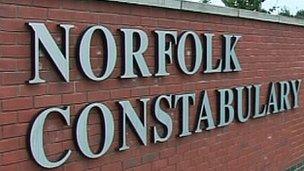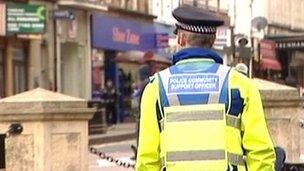Norfolk PCC candidate calls PCSOs 'plastic policemen'
- Published

Candidates for the role of police and crime commissioner in Norfolk took part in the debate
A Norfolk police and crime commissioner candidate has said Police and Community Support Officers (PCSOs) were seen by the public as "plastic policemen".
UKIP candidate Matthew Smith made the claim during a debate at BBC Radio Norfolk on Tuesday which involved all the candidates for the post.
The other candidates all defended the role of PCSOs.
PCSOs were launched in England and Wales in 2002 to tackle the fear of crime and provide back up to forces.
They do not have powers of arrest, cannot interview prisoners or carry out the high risk tasks of police officers.
But PCSOs are able to direct traffic, confiscate drugs and alcohol, issue certain fixed penalty notices and reassure and advise the public - the aim is to deter crime through a visible presence.
Mr Smith said: "What people want is more bobbies on the beat, they are not happy with PCSOs.
"What powers do they have... People want to see real policemen, that have real powers. We need more policemen and more special constables."
He said local people he had talked to did not have faith in PCSOs who were seen as "plastic policemen".
Conservative candidate Jamie Athill said he valued the work of PCSOs and it was "ridiculous" to label them plastic policemen.

PCSOs were launched in England and Wales in 2002
"I've seen at first hand the work of these support officers working in communities. I see them as a key part of the force," he said.
"But any decision I took would be based on the advice of the chief constable and the chief constable would be responsible for any employment issues."
Former Norfolk Police Authority Chairman Stephen Bett, an Independent candidate, said: "PCSOs are there to be the eyes and ears of the police and a presence in the community. They do a fantastic job.
"If we give them extra powers we'd have to give them extra training they'd have to be extracted from the community and they'd lose the local connection.
"The PCSOs do an excellent job and often live in the community. They are very important."
Liberal Democrat candidate James Joyce said PCSOs had been playing an important part in communities across Norfolk.
"PCSOs have been a really great success. In Cawston (in Norfolk) that work with local youths in helping out with everything from a battle of the bands to football," he said.
He said the PCSO's work with young people provided a "figure they can talk too".
'Foster trust'
Steve Morphew, the Labour candidate, said he supported the work undertaken by PCSOs and their work with police.
"PCSOs are terrific," said Mr Morphew, who added that they helped foster "trust in the police by the community... they are not seen as a threat".
He said they were vital to policing in Norfolk and "worth their weight in gold".
Elections will be held in November to choose police and crime commissioners (PCC) who will replace police authorities currently in charge of 41 forces in England and Wales.
The PCCs will be responsible for holding their forces to account. They will also be able to hire and dismiss the chief constable and set the force's budget.
- Published23 October 2012